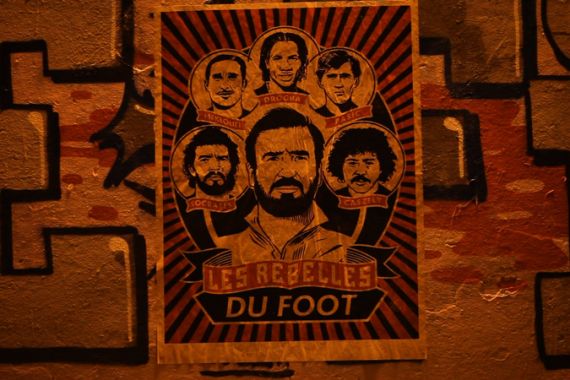
The power of football
Filmmaker Gilles Rof explains why he decided to take a closer look at some of football’s unsung heroes.
Filmmaker: Gilles Rof
My father often told me how in the city of Barcelona in post-war Spain, the stands of Camp Nou rustled with conversations in Catalan. These forbidden words were heard everywhere, despite the terror that Francisco Franco inflicted on his people. Football, then, was incidental. Football, then, was everything.
Keep reading
list of 4 itemsMalaysian football on alert after spate of attacks on top players
PSG dumped out of Champions League as Dortmund reach the final in London
Salah scores to lead Liverpool’s 4-2 rout of Tottenham Hotspur
One should visit the stands of a stadium to feel for what is really happening in that country. In Abidjan, Sao Paulo, Algiers, Santiago or Sarajevo, the vibrations are different, and yet, the vibrations are the same. They travel along the concrete, through the old wooden planks and speak the local language. There are men and women who can witness heroic acts of collective suffering or moments of bravery.
But the locals do not pay too much attention to feelings; they already know in their hearts, their souls and in their heads what they share – a common heritage.
Gilles Perez and I wanted to make the series, Football Rebels , because of the anger we felt towards football stars that were only driven by money and fame. This did not fit in with what we feel and what we know about football.
The idea was to tell football stories of yesterday and today. We wanted to focus on the giants of football, the undoubted talents of the sport. The footballers who were crowned and admired in their times but who also completely transcended the mere status of athletes.
We looked at Rachid Mekloufi from Algeria, Carlos Caszely from Chile, Socrates from Brazil, Predrag Pasic from Bosnia, and Didier Drogba from the Ivory Coast. They all had the courage to oppose the rules and the passivity of their environment.
In extreme historical circumstances, they had the strength to face a government, a front, or a political monster – at the risk of losing everything.
The history of this sport, which does not focus on results or turnover, is marked by rebellion and individual political commitment. These were dramatic but decisive choices.
These “football rebels”, as we have chosen to name them, refused to conform and said “no” in the name of their political worldview. They were prepared to defend the values of solidarity and peace. But they paid a price, often alone. They were often too exposed, too visible.
To present the footballer’s stories, we chose another symbol of rebellion – a sincere and rebellious man, who was capable of taking a stand for these exceptional men, Eric Cantona.
Eric, seen by fans as the king of Manchester United, immediately joined the project. During the filming of the series, he became friends with the rebels, sharing the same values. Like us, he deeply regretted not being able to speak directly to Socrates, the soul of the Corinthians of Sao Paulo, who died in December 2011, a few days before our arrival in Brazil.
About the series:
As the global sporting world faces one corruption scandal after another, former Manchester United star Eric Cantona presents the stories of five football heroes whose social conscience led them to challenge unjust regimes, join opposition movements and lead the fight for democracy and human rights. Football Rebels looks at a side of football that does not always make the headlines.